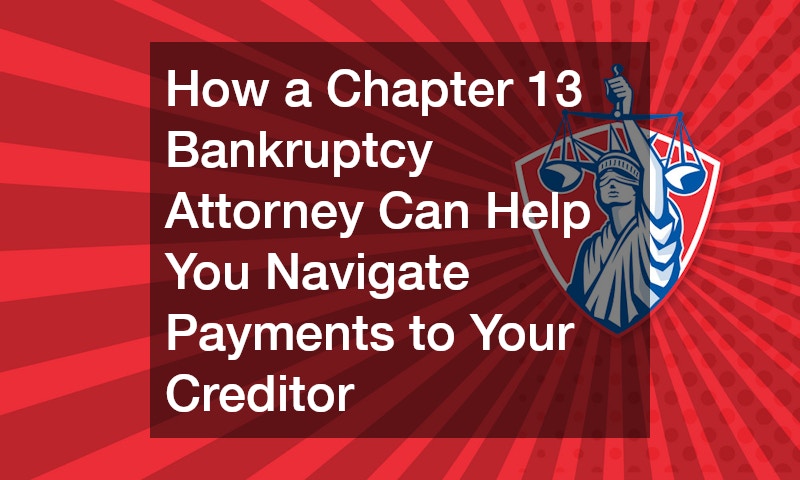
Understanding the role of a Chapter 13 bankruptcy attorney is crucial for individuals struggling with debt. A skilled attorney can provide invaluable assistance in navigating the complexities of payment arrangements during bankruptcy. This article delves into three key topics that commonly concern those considering Chapter 13 bankruptcy.
How Does a Chapter 13 Bankruptcy Attorney Structure a Repayment Plan?
The process begins with a detailed financial assessment conducted by your attorney. They will examine your income, monthly expenses, and outstanding debts to create a realistic budget.
This budget serves as the foundation for your Chapter 13 repayment plan, ensuring that it is both manageable and compliant with bankruptcy laws.
Understanding your financial situation allows the attorney to prioritize payments effectively. Essential expenses, such as housing and utilities, are taken into account to ensure that you maintain a reasonable lifestyle. This thorough evaluation helps prevent the proposal of an unsustainable plan that could lead to future defaults.
Your attorney’s experience is crucial in identifying the right balance between repaying debts and maintaining your standard of living. By carefully analyzing your financial data, they can propose a feasible plan that satisfies the legal requirements and addresses your creditors’ expectations. This meticulous preparation is a vital step toward achieving a successful Chapter 13 bankruptcy outcome.
One of the critical roles of Chapter 13 bankruptcy attorneys is to negotiate favorable terms with creditors. This involves proposing repayment terms that align with the Chapter 13 framework while advocating for your best interests. These negotiations can help reduce interest rates and penalties, making it easier to adhere to the repayment plan.
What Happens if I Can’t Make a Payment?
Life is unpredictable, and financial circumstances can change, affecting the ability to make scheduled payments. In such cases, your Chapter 13 attorney can file a motion to modify the repayment plan. This motion aims to adjust the terms of the plan to reflect the new financial realities you are facing.
Successfully modifying a plan requires a clear demonstration of altered circumstances, such as job loss or increased expenses. The court assesses whether these changes meet the criteria for modification. With your attorney’s guidance, filing for a modification can offer relief and help maintain progress toward financial stability.
In cases of severe financial distress, where even a modified plan becomes unfeasible, a hardship discharge might be an option. This discharge allows certain debts to be forgiven, recognizing that the debtor’s circumstances have made repayment impossible. An attorney experienced in Chapter 13 can advise on eligibility and the legal implications of pursuing this discharge.
Obtaining a hardship discharge requires proof of significant hardship, such as severe illness or disability. Your attorney will compile the necessary documentation and advocate for your case in court. They will explain how a hardship discharge affects your remaining debt and public records, ensuring you make informed decisions.
How Do Legal Fees Factor into My Repayment Plan?
Legal fees are an essential consideration in a Chapter 13 case, and your attorney will work to integrate them into your repayment plan seamlessly. This integration ensures that fees are manageable and spaced over the plan’s duration. Structuring fees in this way prevents financial strain and allows you to focus on repaying your debts.
An attorney experienced in Chapter 13 proceedings understands the importance of maintaining affordability. They will maintain close communication with you to tailor fee agreements to your financial capacity. This careful planning is designed to support the completion of the bankruptcy process without unnecessary complications.
Transparent fee agreements are a critical component of an effective attorney-client relationship. From the initial consultation, the attorney will provide detailed breakdowns of costs, payment schedules, and potential additional fees. This upfront communication helps manage expectations and prevents misunderstandings during the bankruptcy process.
In addition, transparency serves as a foundation for resolving any fee disputes that may arise. Clear documentation and mutual understanding of terms make it easier to address and settle disagreements amicably. By prioritizing open communication regarding fees, your attorney helps maintain a cooperative and supportive attorney-client relationship.
A Chapter 13 bankruptcy attorney plays a pivotal role in guiding debtors through the complexities of designing and maintaining a feasible repayment plan, addressing missed payments, and managing legal fees within the bankruptcy process. By working with an experienced attorney, individuals can navigate these challenges more effectively and work towards financial stability. This partnership offers a path to reorganizing debts and achieving a fresh financial start under the protection of the bankruptcy system.







